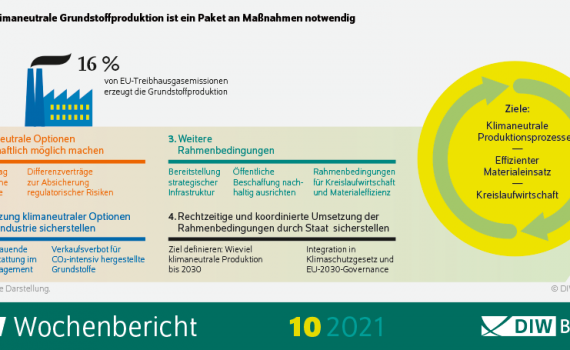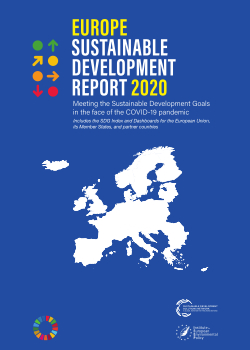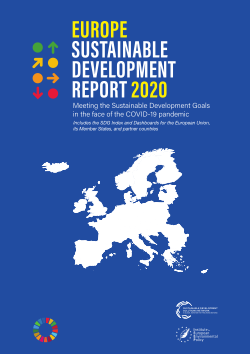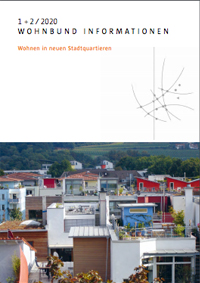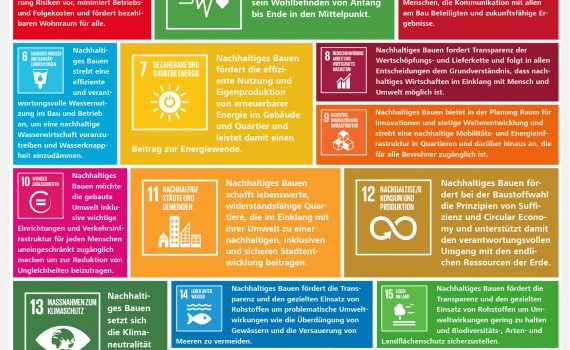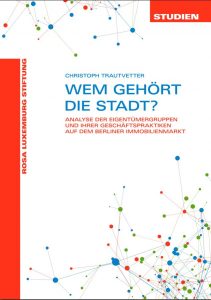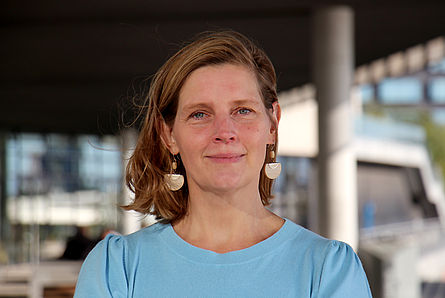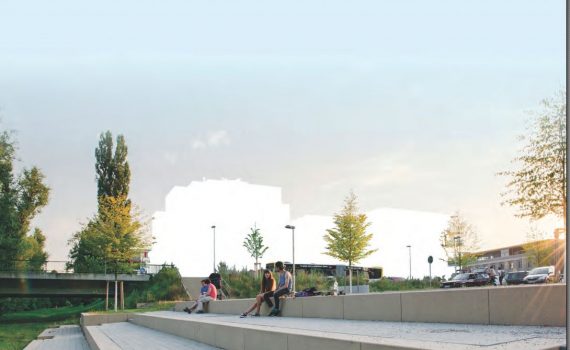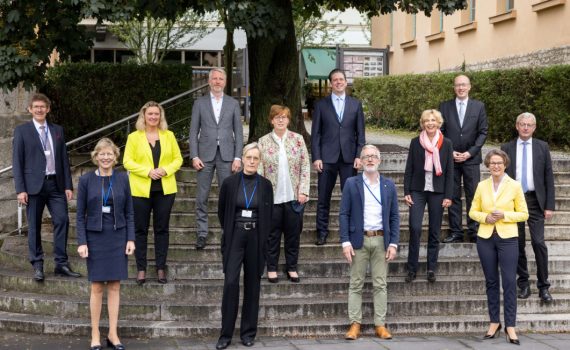Kategorie für Blog: Stakeholders
"Municipalities are crucial drivers for the sustainable development of our society," explains Dr. Werner Schnappauf, Chairman of the German Council for Sustainable Development (RNE). "All 17 sustainability goals are directly or indirectly related to the tasks of a municipality. The new reporting framework sustainable municipality, the BNK, can be a great help for further progress in the field of sustainability", says Schnappauf.
On 1 February 2021, the amendment to the Bavarian Building Code came into force. In the future, the building material wood can be used in all building classes. The legal changes make building in Bavaria easier and faster, more space-saving and more cost-effective.
The state of Baden-Württemberg is setting an example in climate protection: by 2040 at the latest, the state administration is to operate in a climate-neutral manner. The new Climate Protection Foundation supports it in this by using the interest on its share capital to promote research and development as well as educational projects in the field of climate protection. In addition, the state, municipalities, companies and all citizens can offset their CO2 emissions through compensation payments and thus become climate neutral. The cooperation partner will be the non-profit climate protection organisation myclimate Germany.
On 22.12.2020, the Senate passed the first legal ordinance on the Hamburg Climate Protection Act. This regulates the concrete implementation of the solar roof obligation and the integration of renewable energies when replacing heating systems. With these regulations, Hamburg is one of the pioneers in climate protection in the building sector nationwide.
How can Bonn become climate neutral by 2035? This is the question that the participatory project "Bonn4Future - We for the Climate!" would like to discuss together with Bonn citizens over the next two years. Since mid-2019, the climate emergency has been in effect in Bonn; in November 2019, the Council decided that Bonn should become climate neutral by 2035. The city and the non-profit association Bonn im Wandel have now signed a cooperation agreement and thus launched "Bonn4Future".
 Forestry Minister Peter Hauk MdL: "With our call for ideas, we want to further promote municipal timber construction in the state and further consolidate our nationwide position as the No. 1 timber construction state".
A total of around 6.5 million euros in funding from the Baden-Württemberg timber construction campaign is available for the call for ideas for municipal timber construction concepts. The online application deadline is 12 February 2020.
Forestry Minister Peter Hauk MdL: "With our call for ideas, we want to further promote municipal timber construction in the state and further consolidate our nationwide position as the No. 1 timber construction state".
A total of around 6.5 million euros in funding from the Baden-Württemberg timber construction campaign is available for the call for ideas for municipal timber construction concepts. The online application deadline is 12 February 2020.
Constance receives project funding for "Hafner KliEn" from the 7th Energy Research Programme of the Federal Government The city of Constance is striving for sustainable urban development. This should include consideration of the triad of sufficiency, efficiency and substitution in the area of energy policy decisions and climate protection. This also and especially applies to the new city district [...].
 In the context of the Green Deal, the EU's tightened targets on the path to climate neutrality envisage a reduction in CO2 emissions of 55% by 2030 and 100% by 2050. Against the background of these tightened parameters, the question arises as to the impact on the energy transition in Germany. Based on its energy system model REMod, Fraunhofer ISE has calculated the consequences of the new EU targets for the expansion of renewable energies in Germany and now presents the results in a short study.
In the context of the Green Deal, the EU's tightened targets on the path to climate neutrality envisage a reduction in CO2 emissions of 55% by 2030 and 100% by 2050. Against the background of these tightened parameters, the question arises as to the impact on the energy transition in Germany. Based on its energy system model REMod, Fraunhofer ISE has calculated the consequences of the new EU targets for the expansion of renewable energies in Germany and now presents the results in a short study.
Emissions targets, some of them significantly improved, show effectiveness of Paris Agreement / But too few commitments for financing climate protection and adaptation to climate change in poorer countries / Chancellor Merkel must swiftly launch international process for additional climate financing
 A broad alliance of actors from civil society, science, industry and practice is calling on the German government to promote the climate-friendly construction, maintenance and demolition of buildings. Up to now, only the use phase of buildings has been taken into account in state subsidies for buildings and in the Building Energy Act. There is a complete lack of specifications and consideration of the climate impact of building materials and the construction and disposal of buildings - despite the fact that the construction sector, with its upstream and downstream processes, contributes around 8 percent to German greenhouse gas emissions.
A broad alliance of actors from civil society, science, industry and practice is calling on the German government to promote the climate-friendly construction, maintenance and demolition of buildings. Up to now, only the use phase of buildings has been taken into account in state subsidies for buildings and in the Building Energy Act. There is a complete lack of specifications and consideration of the climate impact of building materials and the construction and disposal of buildings - despite the fact that the construction sector, with its upstream and downstream processes, contributes around 8 percent to German greenhouse gas emissions.
 The German Sustainable Building Council (DGNB e.V.) has published a new report explaining how buildings can contribute to the United Nations' global sustainability goals. The publication compares the 17 Sustainable Development Goals (SDGs) with the potential influence of sustainable planning and construction. Architects and planners, as well as building owners and municipalities, are thus provided with orientation as to how they can meaningfully become active in terms of sustainable development. The report also offers a comparison of the SDGs with the criteria of various DGNB certification systems. This shows: Up to 15 of the 17 SDGs are addressed in the context of the DGNB certification of a building project.
The German Sustainable Building Council (DGNB e.V.) has published a new report explaining how buildings can contribute to the United Nations' global sustainability goals. The publication compares the 17 Sustainable Development Goals (SDGs) with the potential influence of sustainable planning and construction. Architects and planners, as well as building owners and municipalities, are thus provided with orientation as to how they can meaningfully become active in terms of sustainable development. The report also offers a comparison of the SDGs with the criteria of various DGNB certification systems. This shows: Up to 15 of the 17 SDGs are addressed in the context of the DGNB certification of a building project.
 On the occasion of the meeting of EU Ministers for Urban Development and Territorial Cohesion on the "New Leipzig Charter", Daniela Wagner, spokesperson for urban development for Alliance 90/The Greens in the German Bundestag, explains:
We welcome the "New Leipzig Charter". Without the transformative power of cities and the ideas and drive of their residents, we will not be able to overcome the challenges of the climate crisis. Nevertheless, the Charter contains significant gaps. The guiding principle of the resilient city is missing. The development of robust and resilient cities is important in order to better assess risks and recognise and prevent dangers in good time. The guiding principle of the healthy city is also not mentioned - despite the heatwaves caused by the climate crisis, a never-ending stream of air pollutants from fossil fuelled combustion engines and the current challenge of a global pandemic.
On the occasion of the meeting of EU Ministers for Urban Development and Territorial Cohesion on the "New Leipzig Charter", Daniela Wagner, spokesperson for urban development for Alliance 90/The Greens in the German Bundestag, explains:
We welcome the "New Leipzig Charter". Without the transformative power of cities and the ideas and drive of their residents, we will not be able to overcome the challenges of the climate crisis. Nevertheless, the Charter contains significant gaps. The guiding principle of the resilient city is missing. The development of robust and resilient cities is important in order to better assess risks and recognise and prevent dangers in good time. The guiding principle of the healthy city is also not mentioned - despite the heatwaves caused by the climate crisis, a never-ending stream of air pollutants from fossil fuelled combustion engines and the current challenge of a global pandemic.
 The ecological model settlement on a former barracks site in Munich sets new standards in timber construction. Various timber construction methods and building types up to seven storeys are being tested side by side in eight building projects with the aim of a final scientific evaluation. Timber frame, timber frame and timber hybrid construction methods are being used.
The ecological model settlement on a former barracks site in Munich sets new standards in timber construction. Various timber construction methods and building types up to seven storeys are being tested side by side in eight building projects with the aim of a final scientific evaluation. Timber frame, timber frame and timber hybrid construction methods are being used.
Around 60 percent of the resources used in Berlin are processed in the construction industry. This contrasts with millions of tonnes of building rubble and construction site waste. Every year, 2.2 million tons of primary raw materials are already saved in civil engineering and building construction in Berlin through the use of quality-assured secondary raw materials. But Berlin does not intend to stop there. By 2030, a further 1.4 million tonnes of primary materials are to be replaced by secondary raw materials each year.
 "To be climate neutral by 2050, we not only need to make additional investments in green and innovative technologies of the future. Above all, we also need a shift from existing investments in 'brown' raw materials such as coal, oil and gas to 'green' climate-friendly technologies. The phase-out of fossil fuels must be global and rapid, in line with the goals of the World Climate Conference. Only in this way can we realistically achieve the climate protection goals. Churches, municipalities and also companies are setting new standards here and demonstrating the feasibility of the changeover in both ecological and economic terms," said Environment Minister Ulrike Höfken today at the event "Divestment and Sustainable Finance", which took place during the Climate Protection Weeks in Rhineland-Palatinate.
"To be climate neutral by 2050, we not only need to make additional investments in green and innovative technologies of the future. Above all, we also need a shift from existing investments in 'brown' raw materials such as coal, oil and gas to 'green' climate-friendly technologies. The phase-out of fossil fuels must be global and rapid, in line with the goals of the World Climate Conference. Only in this way can we realistically achieve the climate protection goals. Churches, municipalities and also companies are setting new standards here and demonstrating the feasibility of the changeover in both ecological and economic terms," said Environment Minister Ulrike Höfken today at the event "Divestment and Sustainable Finance", which took place during the Climate Protection Weeks in Rhineland-Palatinate.
 With the gradual dismantling of ten particularly climate-damaging subsidies in the energy, transport and agricultural sectors, Germany could generate up to 46 billion euros in revenue annually. This is the result of a new study by the "Forum Ökologisch-Soziale Marktwirtschaft" commissioned by Greenpeace.
With the gradual dismantling of ten particularly climate-damaging subsidies in the energy, transport and agricultural sectors, Germany could generate up to 46 billion euros in revenue annually. This is the result of a new study by the "Forum Ökologisch-Soziale Marktwirtschaft" commissioned by Greenpeace.
 Dr. Kirsten David, a researcher at HafenCity University (HCU) Hamburg, has developed an innovative method for determining rent increases after energy efficiency measures: By means of functional cost splitting, rent increases become appropriate and comprehensible. The planning of the energetic measures is also ecologically optimized. For her dissertation entitled "Functional Cost Splitting for the Determination of Rent Increases after Energy Efficiency Measures", the scientist today receives the "BUND Research Award 2020". With the research award, the Bund für Umwelt- und Naturschutz (BUND) honors scientific work on sustainable development.
Dr. Kirsten David, a researcher at HafenCity University (HCU) Hamburg, has developed an innovative method for determining rent increases after energy efficiency measures: By means of functional cost splitting, rent increases become appropriate and comprehensible. The planning of the energetic measures is also ecologically optimized. For her dissertation entitled "Functional Cost Splitting for the Determination of Rent Increases after Energy Efficiency Measures", the scientist today receives the "BUND Research Award 2020". With the research award, the Bund für Umwelt- und Naturschutz (BUND) honors scientific work on sustainable development.
 "In key policy areas, it is not enough to take additional steps; instead, a fundamental transformation must be initiated - the Federal Government recognises this with its dialogue version of the German Sustainability Strategy. The momentum for this transformation is now, and it needs tailwind from all ministries," explained Dr. Werner SchnappaufChairman of the German Council for Sustainable Development (RNE). "The version of the dialogue brings important innovations that will allow the policies of the coming years to be more closely aligned with the guiding principle of sustainability. The designation of transformation areas such as the energy and transport transition or the transition to a circular economy is an important step forward. At the same time, we believe that there is still room for improvement in some areas," said Schnappauf.
"In key policy areas, it is not enough to take additional steps; instead, a fundamental transformation must be initiated - the Federal Government recognises this with its dialogue version of the German Sustainability Strategy. The momentum for this transformation is now, and it needs tailwind from all ministries," explained Dr. Werner SchnappaufChairman of the German Council for Sustainable Development (RNE). "The version of the dialogue brings important innovations that will allow the policies of the coming years to be more closely aligned with the guiding principle of sustainability. The designation of transformation areas such as the energy and transport transition or the transition to a circular economy is an important step forward. At the same time, we believe that there is still room for improvement in some areas," said Schnappauf.
 From 1 January 2021, climate-damaging fossil fuels will be subject to a price of 25 euros per tonne of CO2 is proven. This means that oil and diesel will become more expensive by 7.9 cents per litre, petrol by 7 cents per litre and natural gas by 0.6 cents per kilowatt hour. Citizens will be relieved of the additional costs, among other things, by a reduction in the price of electricity. The amendment, which had already been passed by the Bundestag on Thursday, also passed the Bundesrat today. The Fuel Emission Trading Act (BEHG) is designed to reduce CO2-price in the form of national certificate trading for the heating and transport sectors.
From 1 January 2021, climate-damaging fossil fuels will be subject to a price of 25 euros per tonne of CO2 is proven. This means that oil and diesel will become more expensive by 7.9 cents per litre, petrol by 7 cents per litre and natural gas by 0.6 cents per kilowatt hour. Citizens will be relieved of the additional costs, among other things, by a reduction in the price of electricity. The amendment, which had already been passed by the Bundestag on Thursday, also passed the Bundesrat today. The Fuel Emission Trading Act (BEHG) is designed to reduce CO2-price in the form of national certificate trading for the heating and transport sectors.
 Glaciers are melting, sea levels are rising, heat waves and heavy rainfall are increasing: The consequences of climate change are visible and tangible worldwide, and the window of opportunity to act is shrinking. In order to significantly limit the global effects of climate change, the emission of greenhouse gases on earth must be drastically reduced. The agreement reached by the international community in Paris in 2015 sets the goal of limiting global warming to well below 2 degrees Celsius, but preferably to 1.5 degrees Celsius. Now, the Wuppertal Institute presented a study with possible cornerstones that can help to achieve the 1.5 degree target by 2035. The study shows that a climate-neutral energy system by 2035 is very ambitious, but in principle feasible, provided that all possible strategies from today's perspective are bundled. This requires, above all, bringing forward and intensifying measures that are described in many studies as necessary to achieve greenhouse gas neutrality by 2050.
Glaciers are melting, sea levels are rising, heat waves and heavy rainfall are increasing: The consequences of climate change are visible and tangible worldwide, and the window of opportunity to act is shrinking. In order to significantly limit the global effects of climate change, the emission of greenhouse gases on earth must be drastically reduced. The agreement reached by the international community in Paris in 2015 sets the goal of limiting global warming to well below 2 degrees Celsius, but preferably to 1.5 degrees Celsius. Now, the Wuppertal Institute presented a study with possible cornerstones that can help to achieve the 1.5 degree target by 2035. The study shows that a climate-neutral energy system by 2035 is very ambitious, but in principle feasible, provided that all possible strategies from today's perspective are bundled. This requires, above all, bringing forward and intensifying measures that are described in many studies as necessary to achieve greenhouse gas neutrality by 2050.
"Solar energy is a fundamental pillar of the energy transition. In order to further support this and to achieve our goal - a complete power supply from renewable energies by 2030 - we are further expanding our successful solar offensive: In addition to expanding the solar storage programme, which is in high demand, we are currently developing a solar register for Rhineland-Palatinate. In addition, we will also promote solar carports, balcony plug-in modules, wall boxes or agro-PV projects in the future," announced Environment and Energy Minister Ulrike Höfken during the event under the motto "Solar Offensive Rhineland-Palatinate: Investments for Climate and Economy" as part of the series "Wednesdays at the MUEEF" in Mainz today. Together with guests from the solar industry, nature conservation and citizen energy, she discussed the opportunities of solar energy for the state, for example through the economic factor of the Solar Offensive or cooperative PV projects.
 The Institute for Urban Planning and Social Research WEEBER+PARTNER (Stuttgart) examined 16 case studies and interviewed responsible persons in municipal, cooperative and private housing companies. The projects are characterized by a wide range of planning and construction approaches. According to the study, social diversity requires structural diversity: Rental, social and owner-occupied apartments of different sizes and with diverse layouts were created in the new housing quarters. They are socially mixed - even within buildings - with the respective proportions in the neighbourhood being derived from local requirements. The new quarters also offer space for communal forms of living, for example for older people and those in need of care. And they are characterised by an attractively designed and green residential environment. Concept awards promote the planning and implementation of such projects: Through them, plots of land are not allocated according to the highest price, but for the best concept.
The Institute for Urban Planning and Social Research WEEBER+PARTNER (Stuttgart) examined 16 case studies and interviewed responsible persons in municipal, cooperative and private housing companies. The projects are characterized by a wide range of planning and construction approaches. According to the study, social diversity requires structural diversity: Rental, social and owner-occupied apartments of different sizes and with diverse layouts were created in the new housing quarters. They are socially mixed - even within buildings - with the respective proportions in the neighbourhood being derived from local requirements. The new quarters also offer space for communal forms of living, for example for older people and those in need of care. And they are characterised by an attractively designed and green residential environment. Concept awards promote the planning and implementation of such projects: Through them, plots of land are not allocated according to the highest price, but for the best concept.
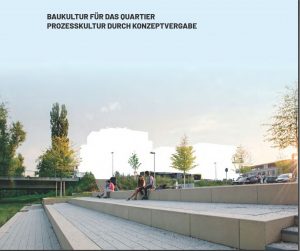 Conceptual procedures are increasingly establishing themselves as a further instrument of municipal land policy for locations with development potential. Here, the property is not allocated according to the highest price, but according to the concept that promises the most sustainable approaches to the further development of the neighbourhood. In this way, the procedures offer municipalities approaches to solving two current and urgent problems: the need for high-quality urban development and affordable housing.
Conceptual procedures are increasingly establishing themselves as a further instrument of municipal land policy for locations with development potential. Here, the property is not allocated according to the highest price, but according to the concept that promises the most sustainable approaches to the further development of the neighbourhood. In this way, the procedures offer municipalities approaches to solving two current and urgent problems: the need for high-quality urban development and affordable housing.
 Hydrogen is an important alternative for sectors stuck in the fossil fuel economy. As national governments and European parliamentarians negotiate the EU's hydrogen strategy, EASAC issues a new commentary. "Hydrogen can help reduce our dependence on fossil fuels," says William Gillett, Director of EASAC's Energy Programme. "But the climate benefits are limited if we use fossil fuels to produce it - even with carbon capture and storage. The EU must put an end to fossil fuel subsidies. The rapidly growing demand for hydrogen must be met by a massive increase in electricity generation from renewables, together with certified imports from third countries."
Hydrogen is an important alternative for sectors stuck in the fossil fuel economy. As national governments and European parliamentarians negotiate the EU's hydrogen strategy, EASAC issues a new commentary. "Hydrogen can help reduce our dependence on fossil fuels," says William Gillett, Director of EASAC's Energy Programme. "But the climate benefits are limited if we use fossil fuels to produce it - even with carbon capture and storage. The EU must put an end to fossil fuel subsidies. The rapidly growing demand for hydrogen must be met by a massive increase in electricity generation from renewables, together with certified imports from third countries."
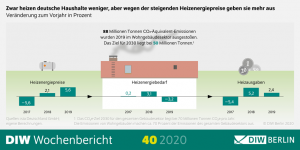 Annual DIW Heat Monitor based on data from energy service provider ista Deutschland GmbH: Heating energy demand in residential buildings declines again for the first time since 2015 - Rising prices, however, cause heating expenditure to increase by 2.4 percent - CO2emissions have fallen by 21 percent overall since 2010, but by only 2.6 percent when adjusted for temperature - Energy-efficient renovation in residential buildings almost stagnant
Annual DIW Heat Monitor based on data from energy service provider ista Deutschland GmbH: Heating energy demand in residential buildings declines again for the first time since 2015 - Rising prices, however, cause heating expenditure to increase by 2.4 percent - CO2emissions have fallen by 21 percent overall since 2010, but by only 2.6 percent when adjusted for temperature - Energy-efficient renovation in residential buildings almost stagnant
 "Solar energy is a fundamental pillar of the energy transition. In order to further support this and to achieve our goal - a complete power supply from renewable energies by 2030 - we are further expanding our successful solar offensive: In addition to expanding the solar storage programme, which is in high demand, we are currently developing a solar register for Rhineland-Palatinate. In addition, we will also promote solar carports, balcony plug-in modules, wall boxes or agro-PV projects in the future," announced Environment and Energy Minister Ulrike Höfken during the event under the motto "Solar Offensive Rhineland-Palatinate: Investments for Climate and Economy" as part of the series "Wednesdays in the MUEEF" in Mainz today.
"Solar energy is a fundamental pillar of the energy transition. In order to further support this and to achieve our goal - a complete power supply from renewable energies by 2030 - we are further expanding our successful solar offensive: In addition to expanding the solar storage programme, which is in high demand, we are currently developing a solar register for Rhineland-Palatinate. In addition, we will also promote solar carports, balcony plug-in modules, wall boxes or agro-PV projects in the future," announced Environment and Energy Minister Ulrike Höfken during the event under the motto "Solar Offensive Rhineland-Palatinate: Investments for Climate and Economy" as part of the series "Wednesdays in the MUEEF" in Mainz today.
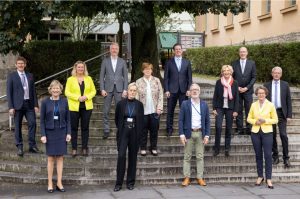 At their meeting in Weimar on 24 and 25 September, the construction ministers of the federal states adopted resolutions on social housing, the use of ecological building materials and the digitalisation of the building permit process, among other things.
The EU's plan to become involved in the area of public housing promotion as part of the new "InvestEU" fund was criticised. The federal government was therefore called upon to advocate a modification of the programme so that subsidies are only granted if the provisions of regional, national or federal funding regimes are observed, in particular if rent and occupancy restrictions are stipulated. The Chairman of the Conference of Building Ministers, Thuringia's Infrastructure Minister Benjamin-Immanuel Hoff, said: "Creating affordable housing in Germany remains an important task. The federal government must continue to provide at least the same level of funding. In order to make faster progress, we need more money in the system. The EU's commitment is therefore to be welcomed in principle. But we must ensure that the funds also reach social housing construction, and we agree that this can best be achieved through the established funding programmes of the federal states."
At their meeting in Weimar on 24 and 25 September, the construction ministers of the federal states adopted resolutions on social housing, the use of ecological building materials and the digitalisation of the building permit process, among other things.
The EU's plan to become involved in the area of public housing promotion as part of the new "InvestEU" fund was criticised. The federal government was therefore called upon to advocate a modification of the programme so that subsidies are only granted if the provisions of regional, national or federal funding regimes are observed, in particular if rent and occupancy restrictions are stipulated. The Chairman of the Conference of Building Ministers, Thuringia's Infrastructure Minister Benjamin-Immanuel Hoff, said: "Creating affordable housing in Germany remains an important task. The federal government must continue to provide at least the same level of funding. In order to make faster progress, we need more money in the system. The EU's commitment is therefore to be welcomed in principle. But we must ensure that the funds also reach social housing construction, and we agree that this can best be achieved through the established funding programmes of the federal states."
Following the interim results of the Housing Summit and the Building Land Commission, demands are being voiced by the scientific community: The still tight housing markets require the use of additional instruments by the federal and state governments. Otherwise, the turnaround towards affordable housing cannot be achieved.

